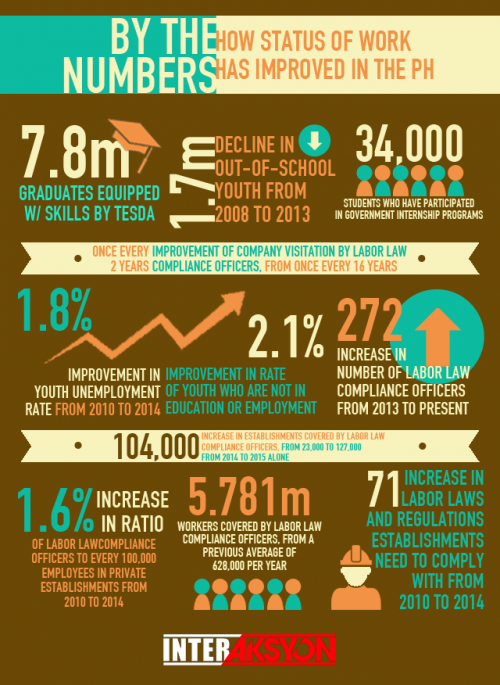
MANILA – Before the Department of Labor and Employment (DOLE) and the International Labor Organization (ILO) put a labor law compliance system in place in August 2013, labor inspectors would only inspect companies once every 16 years to check whether they were following labor laws and standards.
Today, it is guaranteed that a company will be visited once every two years.
This is according to Labor Secretary Rosalinda Baldoz, who touted the government’s efforts to improve working conditions in the Philippines before guests at the launch of the United Nations Human Development Report 2015 in Makati City on Monday.
This year’s Human Development Report, created for the United Nations Development Programme, focused on work as something which enables people to enjoy long, healthy, and creative lives.
To improve labor compliance and to guarantee the rights and benefits of Filipino workers, Baldoz said that her office grew the number of labor law compliance officers from 284 to 556.
This number led to a rise in establishments covered by the inspections, from an annual average of 23,000 to 127,000 in 2014 and 2015 alone.
The number of workers covered by the labor law compliance officers also went up, from an annual average of 628,000 to 5.781 million in 2014 and 2015.
Incentives were also given to companies which were compliant with labor laws and standards, Baldoz said.
Such reforms were recognized by the ILO and the Association of Southeast Asian Nations.
Meanwhile, another initiative by the DOLE was given the Presidential Lingkod Bayan Award: the Single-Entry Approach to labor dispute settlement. Here, every case from any office at the DOLE goes through a mandatory 30-day process of settlement.
Baldoz explained that it was a “deliberate strategy to de-judicialize the existing labor dispute resolution to produce an outcome of a win-win situation (for employer and employee).”
Here, the processing time of labor case resolution was reduced to an average of 15 days from the usual one year or more.
Youth in the labor force
To curb youth unemployment rate, which was at 17.6 percent in 2010 and improved to 15.8 percent in 2014, DOLE put in place a Special Program for the Employment of Students (SPES).
According to the Department of Education, it is an “annual summer employment program that invites students to immerse themselves in government as well as hone their sense of leadership and public service.”
Some 828,000 students have benefited from this. 34,000 students, meanwhile, have taken advantage of Government Internship Programs to be exposed to careers in government.
JobStart was another DOLE program, undertaken in partnership with the Asian Development Bank and the Canadian government.
Here, “vulnerable youth” are equipped with skills that employers require of their employees, Baldoz said. 1,413 youth have benefited from JobStart, she added.
Creating quality work opportunities
Baldoz also spoke about the boost they gave Phil-JobNet as the “national labor market information portal.” On this website, jobseekers can look for openings, while employers can post their vacancies.
From 44,000 applicants, there were now 1.067 million applicants on the site.
Baldoz added that DOLE built a network of career guidance counselors around the country so that jobseekers can make better decisions, as well as enhanced technical-vocational training programs to ensure a wider reach, even as the department focused on high demand for skilled workers.
Meanwhile, National Economic and Development Authority director-general Arsenio Balisacan took pride in the DepEd’s Abot-Alam program for out-of-school youth to have knowledge, as well as entrepreneurial and other skills.
He added that the Philippines was the second country to ratify the ILO Convention on Decent Work for Domestic Workers, recognizing that they have rights and are entitled to protection under the law.
Balisacan said that the Philippines has also signed bilateral agreements with Saudi Arabia, Jordan, and Lebanon for the protection of overseas Filipino domestic workers.
The Kasambahay Law was also enacted, with 1.9 million domestic workers now recognized as members of the informal sector with appropriate “rights, benefits, trainings, and competency assessments.”
Much still needs to be done
Despite the achievements, Balisacan said, much still needs to be done.
Provision of decent work, higher productivity rates, and the reduction in the number of working poor (or those living under $2 a day) are some of the nation’s immediate challenges.
There is also a lack of green jobs for sustainable development.
A high number of women and children are trafficked for sexual exploitation and forced labor, as well. Children also continue to work in hazardous and dangerous situations, Balisacan said. –Manel Solsoloy and Tricia Aquino, InterAksyon.com